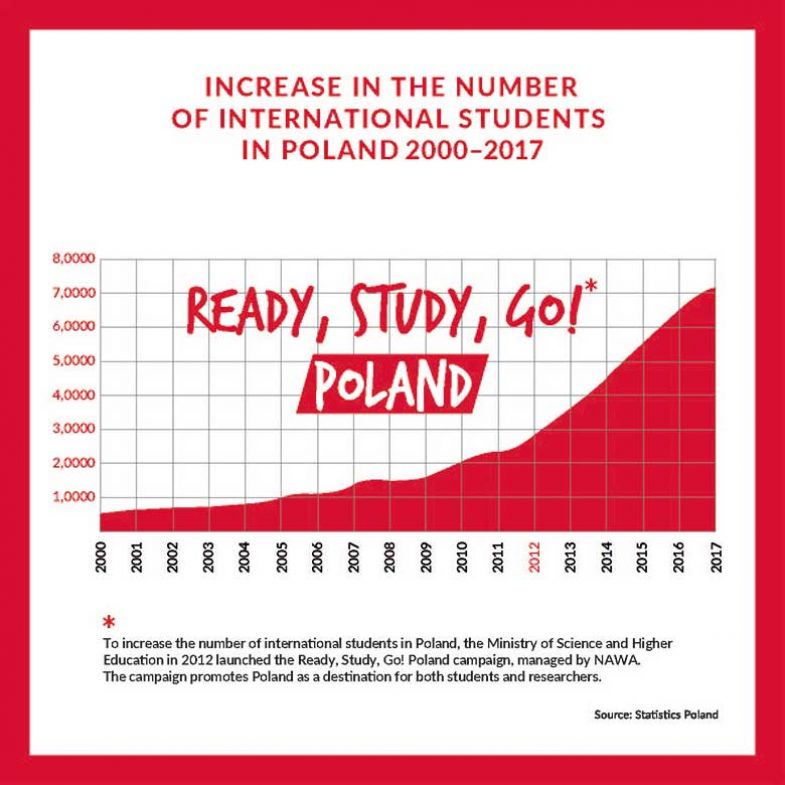
NAWA is enabling the personal and professional growth of students and academics
All aspects of life in Poland are changing, including the internationalisation of higher education and science – the main focus of the Polish National Agency for Academic Exchange. In addition to issuing 235,600 work permits to third-country nationals in 2017, Poland also hosts 72,743 students from 166 states, is ranked among the world’s top 25 most developed economies and has an unemployment rate that is one of the lowest in Europe.
Central and eastern European countries need to make an effort to establish themselves in global higher education. NAWA aims to strengthen Polish universities through international exchange and cooperation. Plenty has already been achieved. In the Nature Index 2016 Rising Stars ranking, which assesses the publication performance of countries and institutions based on publications in 68 high-profile journals on life sciences, Poland recorded the highest increase between 2012 and 2015, of 34 per cent.
The fields that fuel the development of Polish science include physics, astronomy, nanotechnology and genetics. The establishment of two agencies that finance research with grants has been crucial for the development of Polish science. The National Science Centre supports basic research while the National Centre for Research and Development is focused on financing implementing activities and cooperation between science and businesses.
These institutions, with an annual budget of PLN1.35 billion (£280 million) and almost PLN5 billion respectively in 2018, create opportunities for research development at Polish universities, while the growing number of applicants shows that conducting research in Poland is becoming attractive – and not only for Poles. Moreover, numerous Polish centres have used co-financing obtained from EU funds to purchase large scientific and research equipment. From 2007-2013, a total of 1,949 laboratories in Poland received co-financing from European funds.

The Polish Ministry of Science and Higher Education’s Excellence Strategy – Research University project also aims to ensure higher financing for leading scientific centres and allocate public funds to fields and institutions that show the greatest potential for scientific growth. The evaluation system will be based mainly on the quality of institutions’ publications and their contribution to the development of global science. The Constitution for Science Act, which took effect on 1 October 2018, is designed to help by increasing universities’ autonomy.
Improved research quality should further improve Poland’s ability to attract international students. The main benefits of studying in Poland include the sense of safety, a friendly atmosphere and a wide variety of cultural and leisure activities. These were highlighted in a recent survey conducted by the Ministry of Science and Higher Education, which sampled 2,660 students. Of the respondents, 74 per cent rated the culture and entertainment offered by Poland as “high” or “very high”, while 72 per cent stated that they felt safe in Poland. The majority would recommend studying in Poland to their fellow nationals. Students also praised Poland’s friendly atmosphere as well as the environment of Polish cities, which were described as a “new experience” and places where it is possible to study in English and benefit from a low cost of living.
The survey revealed that international students prefer to study social and technical sciences, partly owing to the rising profile of Polish business schools. This was reflected in the European Business School Ranking, published by the Financial Times in December. It listed two Polish higher education institutions: Kozminski University, which has been included for many years, ranked 43rd, and the Warsaw School of Economics, which debuted in 71st place.

IT studies in Poland have gained greater recognition. The top 20 most popular fields of study in the 2016-17 academic year also included mechanics and mechanical engineering. Regarding the latter, students from the Czestochowa University of Technology and the Kielce University of Technology finished first and third respectively in the 2018 University Rover Challenge, a prestigious competition to build a Mars rover. In 2011, a team from the Bialystok University of Technology was crowned winner after defeating entrants who built their machine with the support of Nasa.
The biggest challenge facing the internationalisation of science and higher education in Poland is making up for lost time. The country needs to bridge the gap caused by the Communist era, overcome stereotypes about it being a poor country on the Vistula River and encourage international staff and students to come and see Poland for themselves.
Poland’s current legislation should facilitate hosting students and scientists from abroad. Other crucial measures undertaken include increasing the number of courses delivered in English and addressing the excessive fragmentation of the Polish university system, as well as the consistent implementation of quality-oriented evaluation of research. When combined, these could stop the brain drain and strengthen Poland’s scientific and academic exchange, offering unique conditions for professional and personal development on a European scale – and demonstrate that the essence of higher education need not be confined by borders.
Find out more about the Polish National Agency for Academic Exchange (NAWA).






